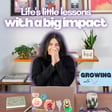
Two Latine Poets To Read: Leisly Ann Roman and Jose Hernandez Diaz
This is the poetry celebration that validates our dual identity and mental health struggles. The moment when you find books that perfectly capture being "bad Mexican, bad American" and realize you're not alone in navigating multiple cultural spaces.
Here's what we're highlighting for Latine Heritage Month:
"Bad Mexican, Bad American" by Jose Hernandez Diaz
- Slice-of-life poetry exploring dual cultural identity through vignettes
- Perfect for anyone with "one foot in one culture, one foot in another"
- Addresses the "pocho" experience and language struggles
- Set in Los Angeles, captures Mexican-American experience authentically
- Shows how you're Mexican in America, American in Mexico - never fully fitting either space
"Living in Phases" by Leisly Ann Roman
- Dominican-American poet writing entire collection on mental health journey
- Crucial representation for Latine community where mental health is stigmatized
- Shows mental health as "fluctuating, moving, bending thing" - not linear progression
- Begins and ends with poems for her parents, connecting healing to family roots
- Incorporates Spanglish and cultural identity throughout mental health narrative
Both poets create work that reflects our experiences as children of immigrants, validating feelings of cultural displacement while celebrating the beauty of our dual identities. These collections provide representation we desperately need.
Get the Books: 📖 "Bad Mexican, Bad American" by Jose Hernandez Diaz 📖 "Living in Phases" by Leisly Ann Roman
🎧 Related Episode: The Power and Beauty of Spanglish - Because here's what these poets understand: being Chicana feels like "the one identity that really feels whole" when everything else leaves you straddling two worlds. Poetry helps us process these complex cultural experiences and find home in our authentic selves.
Subscribe. Share. Remember that our voices and experiences deserve to be celebrated in literature.
Small steps, big healing. Keep growing! ✨
Join the conversation! What Latino poets are on your reading list? DM me your recommendations on Instagram @YourCoachMari
💬 LET'S CONNECT:
Send in questions: contact+podcast@marisolmoran.com
We might just have the same taste in books. Check out my Book List.
(Bookshop affiliate)
🌱 LET’S GROW TOGETHER
